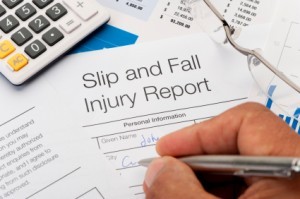Our client in this Oregon slip and fall case was injured while on the job. He was employed at a store where he stocked shelves and put recent deliveries in the stock room. On the day of his accident, our client had started work on time and his initial job was to move cartons of bottled liquids from the delivery area to the stock room. As he lifted a carton and started walking, the soggy bottom of the carton gave way, causing half gallon bottles to fall to the floor, break, and spill their contents all over. The liquid and glass on the floor caused our client to slip and fall.
 As our client fell, he instinctively extended his arm to break his impact with the floor. When the inevitable moment of impact arrived, his hand landed on a large piece of glass that severed a tendon in one of his fingers. Our client picked himself up from this fall and went directly to the emergency room, where he underwent surgery to repair the tendon. The emergency physicians treating him recommended rehabilitation consisting of physical therapy to regain movement in his finger.
As our client fell, he instinctively extended his arm to break his impact with the floor. When the inevitable moment of impact arrived, his hand landed on a large piece of glass that severed a tendon in one of his fingers. Our client picked himself up from this fall and went directly to the emergency room, where he underwent surgery to repair the tendon. The emergency physicians treating him recommended rehabilitation consisting of physical therapy to regain movement in his finger.
Upon investigation it was immediately clear that the cartons had become wet from a leak in the semi truck that transported them. Our client had not been advised that the cartons were wet when they were dropped off and left in his care. The freight company initially denied liability, claiming that it was normal for trailers to leak in Oregon during cold winter months. It also claimed that store employees were aware that cartons often arrived wet.
Our client hired the experienced and caring premises liability attorneys at Dwyer Williams Cherkoss to help him in this messy workplace slip and fall case. We demonstrated to the freight company that it is not “normal” for the inside of trailers to be wet during Oregon winters. We showed that the driver never notified any store employees that the cartons were wet at the time of delivery. This information was not written on the delivery invoice and had not been communicated orally when the driver stacked the cartons after taking them out of his truck.
With this information, the freight company conceded liability for the injuries sustained by our client. In spite of the hurdles in this case, we were able to obtain a fair settlement that included paying our client’s medical providers and compensating him for his pain and suffering.

